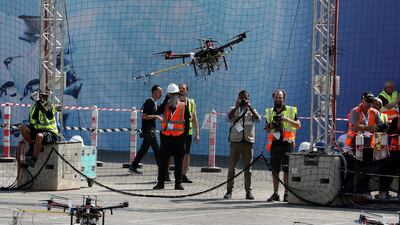Thirty-two teams from universities around the world brought their best drones and robots to compete in Abu Dhabi this week at the Mohamed Bin Zayed International Robotics Challenge.
The international competitors demonstrated their abilities to tackle real world challenges like taking another drone out of the sky, building a wall and putting out a fire in a high-rise during the hi-tech event.
Khalifa University of Science and Technology, organisers of the MBZIRC 2020, whittled down the field from 134 applicants to those elite 32, granting $3 million (Dh11 million) to the competitors to hone their projects and come to the UAE to compete for a $2 million prize (Dh7.35 million).
The overall winners of the event was a joint team formed by members of Czech Technical University, University of Pennsylvania and New York University.
The organisers “focused on challenges that are important to humanity in terms of saving lives”, said Arif Sultan Al Hammadi, executive vice president of the university.
“These scientists coming to Abu Dhabi ... are trying to compete to solve these challenges and I would say in the next two to five years you will find the same products that they are making ... next door at Umex and becoming solutions.”
The three-day MBZIRC 2020 is hosted alongside the Unmanned System Exhibition (Umex), one of the biggest defence technology exhibitions in the region.
"Our aim was to see what the state of the art in robotics is and push the boundaries a bit more," Lakmal Seneviratne, an associate VP for research and director of Khalifa University Centre for Autonomous Robotic Systems, told The National.
Mid-way through the first day of the three-day competition, no team had successfully completed a challenge. By the end of day three, for every successful fire put out, drone downed or wall built, there were dozens of incomplete or aborted missions. Mr Seneviratne said that was somewhat by design.
“This is the reality of robotics,” he said. “You see YouTube or read stories you think robots are magic” but developing the technology is in fact extremely challenging, and the students are still honing their competence with artificial intelligence.
The Fly Eagle Team from Beijing Institute of Technology was successful on the first challenge, taking another drone out of the sky with its own autonomous flyers.
“It’s hard, very hard. Much harder than the first competition”, Tao Song, the team leader, told The National, referring to the first edition of MBZIRC held in 2018.
“This competition is a big event because we not only participated but we learned from other teams,” he added. “Someone is really good at computer vision, another is good at control systems. I’d like to thank the organisers for allowing this exchange to happen,” he said.
For Yusra Alkendi, a member of Team Al Nokhba UAE, and a PhD candidate at Khalifa University, it is not dealing with the robots themselves that is the challenge.
“Dealing with robots isn’t hard,” said. But taking them out of a lab environment is where it gets challenging, she said, as troubleshooting the root of hardware or software problems accurately and quickly is tough with so many variables.
Ultimately, Ms Alkendi said she is optimistic that robots and drones will serve humanity in taking up tasks in harsh environments. After all, “we can program them to help,” Ms Alkendi said.


